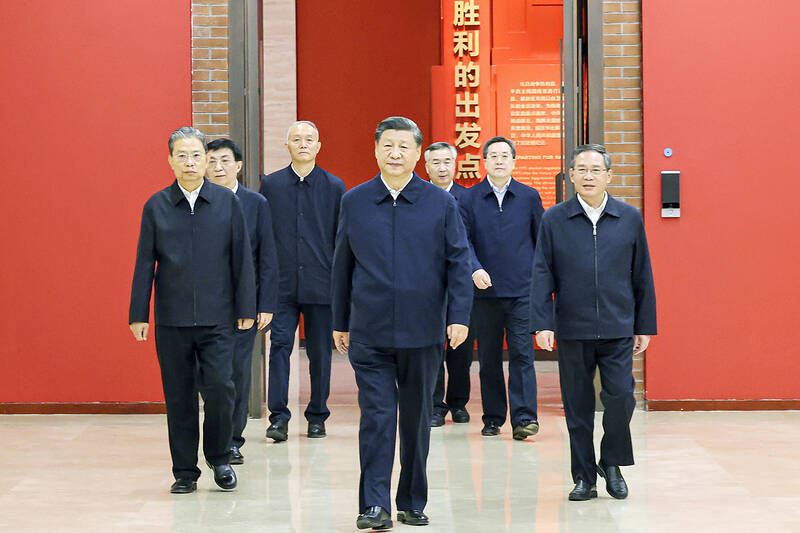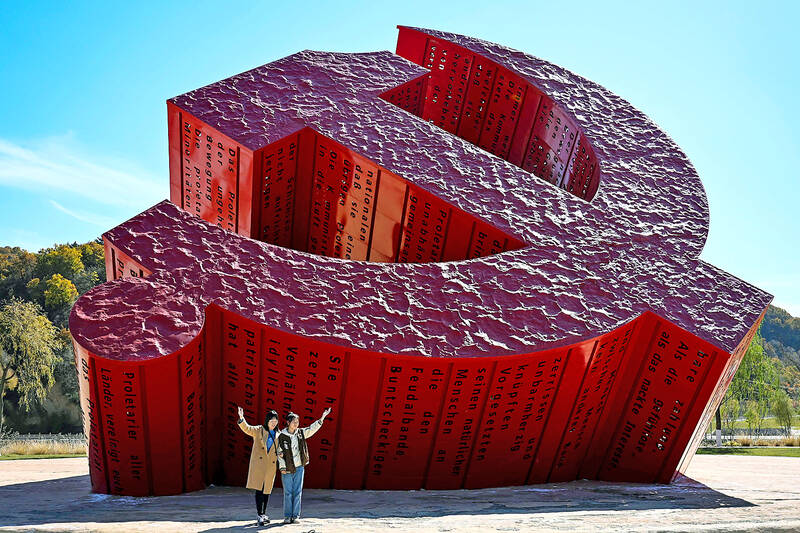Dressed in matching navy windbreakers and flanking Chinese President Xi Jinping (習近平), China’s freshly appointed top leadership this week made their first group outing to the Chinese Communist Party’s “holy land.”
Xi’s choice to visit Yanan — a site inextricably linked with Mao Zedong (毛澤東) and communist China’s founding — was an important, deliberate indication of the themes of his next five years at the helm, analysts said.
Xi has centralized and personalized power more than any Chinese leader since Mao, culminating in his being anointed with a historic third term following a Chinese Communist Party (CCP) congress. The new CCP Politburo Standing Committee he shepherded around the popular “red tourism” destination on Thursday consists solely of his loyal allies.

Photo: AP
“The signal with the visit to Yanan is one of celebrating a parallel [with Mao] and brooking no opposition,” said Manoj Kewalramani, a China studies fellow at the Takshashila Institution in Bengaluru, India.
A 16-minute news segment about the visit on China Central Television showed several portraits of Mao, and a report by Xinhua news agency mentioned the former leader’s name 14 times.
The itinerary included visits to Mao’s former residence, as well as a hall where a pivotal CCP meeting in 1945 confirmed him as party chairman, apparently showcasing Xi’s deep interest in party history and its influence on his rhetoric and policies.

Photo: AFP
However, it also harked back to an era when the CCP relied on mass “struggle” to win a bloody civil war, which observers believe has parallels with how Beijing views the current geopolitical climate.
“Among the signals Xi appears to be sending ... is prepare for difficult times ahead, and prepare for struggle,” said Bill Bishop, a veteran China watcher who runs the Washington-based Sinocism newsletter.
Xi in 2012 took the then-freshly inaugurated standing committee to an exhibition about national rejuvenation in Beijing, and in 2017 led top officials the site of the first CCP congress in Shanghai.
“The first travels after each party congress seems to be about ‘remember the original mission,’” Sung Wen-ti (宋文堤), a lecturer on Taiwan-China-US relations at the Australian National University, wrote on Twitter.
State media reported that Xi on Thursday vowed that his new standing committee would “inherit and carry forward the fine revolutionary traditions formed by the party during the Yanan period.”
Yanan is revered in CCP lore as the cradle of the movement. Nestled in the remote, arid mountains of northwestern China, it was where party members hunkered down after the Long March, a gruelling year-long expedition by foot across the country to escape encirclement by Chinese Nationalist Party (KMT) troops during the Chinese Civil War. Tens of thousands died en route, and by the time the survivors arrived in Yanan, they were a severely weakened force.
Mao and his allies, including Xi’s father, lived alongside local peasants in caves as they planned military campaigns.
The CCP’s eventual victory saw the Yanan period codified as a shining example of the party’s ability to overcome adversity.
Yanan is also firmly linked to Mao and his consolidation of power.
More than 10,000 people, including intellectuals and artists, were killed during the Yanan Rectification — a mass campaign of indoctrination and purges that established Mao as the undisputed leader.
However, Xi on Thursday said that “through the Yanan Rectification movement, the whole party united under the banner of Mao Zedong and achieved unprecedented unity.”
“A firm and correct political orientation is the essence of the Yanan spirit,” he said
One of the hallmarks of Xi’s tenure has been a focus on intra-party discipline, most obviously through a long-running anti-corruption campaign.
Critics say that drive is a thinly veiled political tool that has eliminated many of his rivals.
Xi tends to think of himself as an “heir of the revolution,” Huron University College sinologist Alfred Chan (陳仲禮) said.
In speeches, Xi has sought to draw a direct line between the past and present, using history as a source of legitimacy for both the party and himself, Chan said.
On Thursday, for example, he referred to his personal connections to Yanan.
During the height of the Cultural Revolution, 15-year-old Xi was sent to the village of Liangjiahe, where he also slept in caves and was shocked at the harshness of manual labor.
He often cites this period as a formative life experience that gave him grit and determination, as well as an insight into the lives of ordinary working class Chinese.
It is also a way in which Xi attempts to mould his public persona and life story in the vein of Mao, analysts say.
“Xi wants to go back to the orthodoxy of communism in China like Mao,” said Alfred Wu (吳木鑾), a Chinese politics expert at the National University of Singapore.

Thousands gathered across New Zealand yesterday to celebrate the signing of the country’s founding document and some called for an end to government policies that critics say erode the rights promised to the indigenous Maori population. As the sun rose on the dawn service at Waitangi where the Treaty of Waitangi was first signed between the British Crown and Maori chiefs in 1840, some community leaders called on the government to honor promises made 185 years ago. The call was repeated at peaceful rallies that drew several hundred people later in the day. “This government is attacking tangata whenua [indigenous people] on all

RIGHTS FEARS: A protester said Beijing would use the embassy to catch and send Hong Kongers to China, while a lawmaker said Chinese agents had threatened Britons Hundreds of demonstrators on Saturday protested at a site earmarked for Beijing’s controversial new embassy in London over human rights and security concerns. The new embassy — if approved by the British government — would be the “biggest Chinese embassy in Europe,” one lawmaker said earlier. Protester Iona Boswell, a 40-year-old social worker, said there was “no need for a mega embassy here” and that she believed it would be used to facilitate the “harassment of dissidents.” China has for several years been trying to relocate its embassy, currently in the British capital’s upmarket Marylebone district, to the sprawling historic site in the

The administration of US President Donald Trump has appointed to serve as the top public diplomacy official a former speech writer for Trump with a history of doubts over US foreign policy toward Taiwan and inflammatory comments on women and minorities, at one point saying that "competent white men must be in charge." Darren Beattie has been named the acting undersecretary for public diplomacy and public affairs, a senior US Department of State official said, a role that determines the tone of the US' public messaging in the world. Beattie requires US Senate confirmation to serve on a permanent basis. "Thanks to

‘IMPOSSIBLE’: The authors of the study, which was published in an environment journal, said that the findings appeared grim, but that honesty is necessary for change Holding long-term global warming to 2°C — the fallback target of the Paris climate accord — is now “impossible,” according to a new analysis published by leading scientists. Led by renowned climatologist James Hansen, the paper appears in the journal Environment: Science and Policy for Sustainable Development and concludes that Earth’s climate is more sensitive to rising greenhouse gas emissions than previously thought. Compounding the crisis, Hansen and colleagues argued, is a recent decline in sunlight-blocking aerosol pollution from the shipping industry, which had been mitigating some of the warming. An ambitious climate change scenario outlined by the UN’s climate